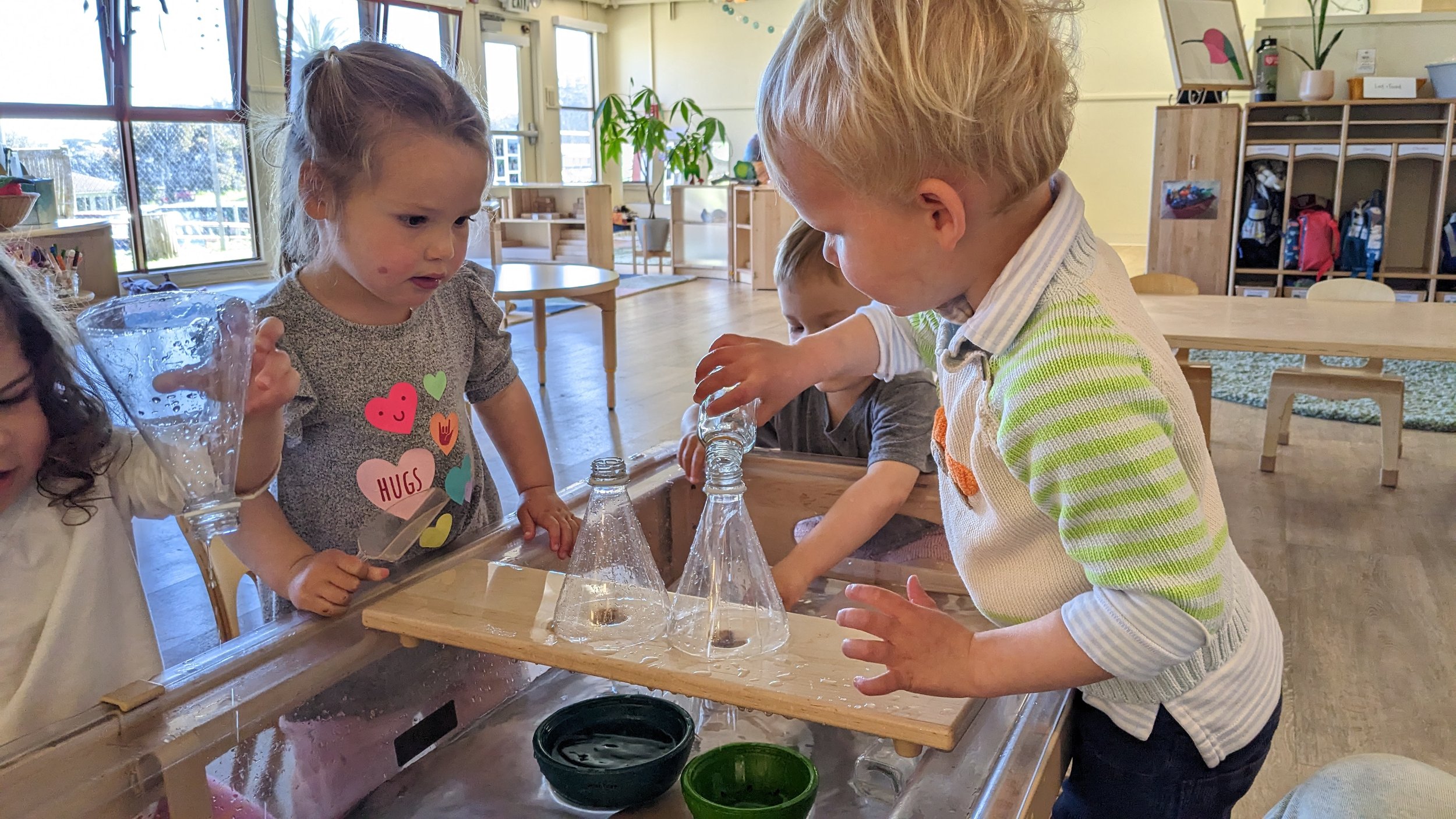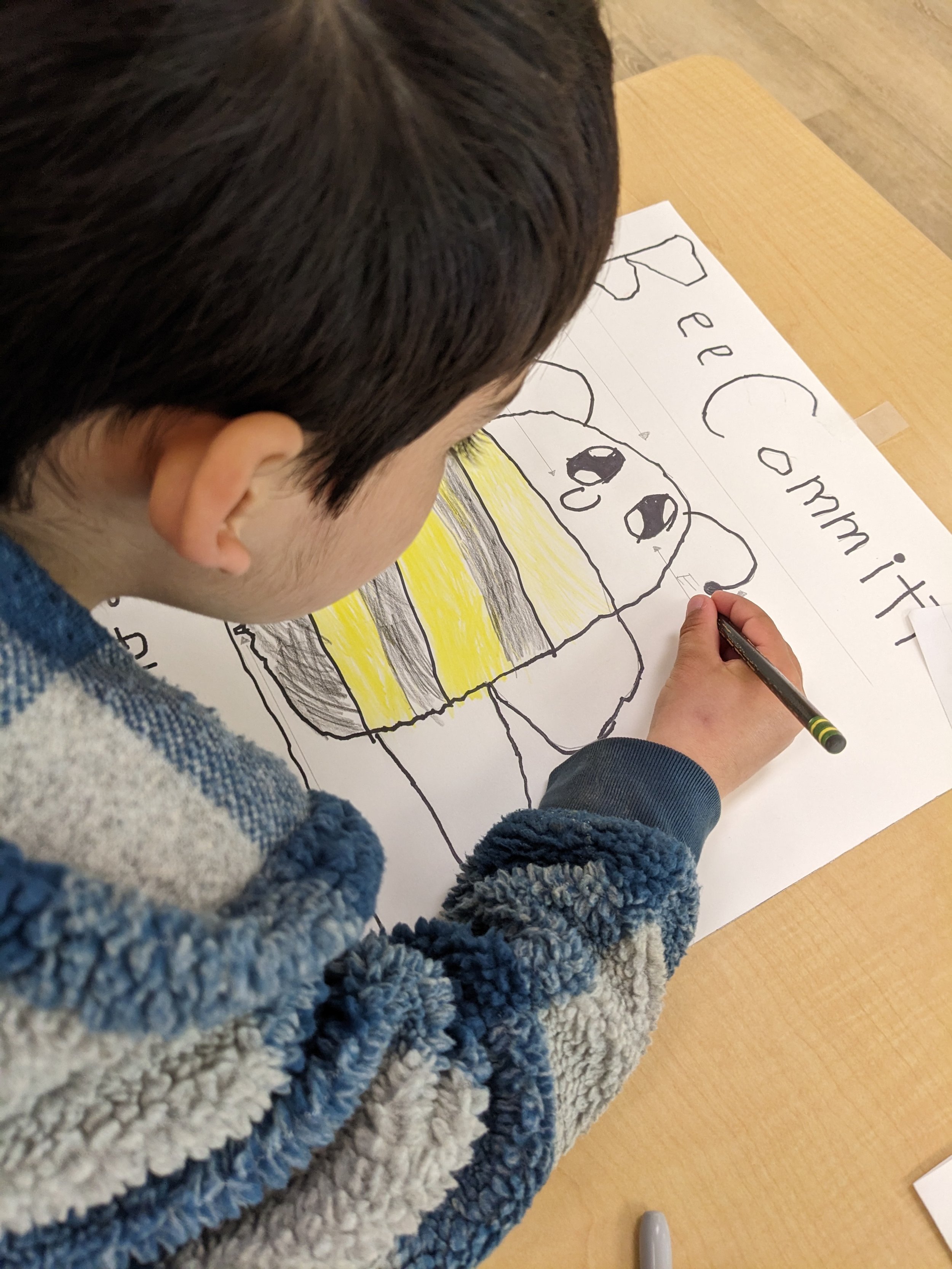
Curriculum
CURRICULUM
The curriculum at Cypress School is based on play, inquiry, exploration, developing relationships, and love of learning according to the natural patterns of the individual child within the context of group learning experiences.
Our social constructivist approach to early education acts as both lens and guide for designing curriculum, spaces, and experiences that honors children and childhood. Through rich, learner-centered experiences, it is our goal to cultivate curiosity, critical thinking, stewardship, social responsibility, and a lifelong love of learning.
Anti-Bias Education
At the heart of our anti-bias curriculum is a vision of a world in which all children are able to thrive and all families have a sense of belonging. These are the four goals of anti-bias education as outlined by L. Derman-Sparks and J. Olsen Edwards:
Each child will demonstrate self awareness, confidence, family pride and positive social identities
Each child will express comfort with human diversity; accurate language for human differences, and deep caring connections.
Each child will increasingly recognize unfairness, have language to describe unfairness and understand that unfairness hurts.
Each child will demonstrate empowerment and the skills to act, with others or alone, against prejudice and/or discriminatory actions.
We believe that school is a place grounded in the pursuit of social justice, social responsibility, human dignity and respect for all. As an anti-bias, anti racist school our curriculum, interactions, choices and even the environment cultivate and support the following understanding:
Respect and empathy for:
Different ideas and perspectives
Human differences in appearance, culture, and lifestyle
Both the individual and the group
Interconnection between:
Our actions which always have an impact on others
People - the family, the school, the teachers, the environment
Social responsibility to:
Contribute and participate in one’s community
Take care of the environment
Fairness and equity of:
Children’s right to access quality materials. Experiences,and education
Human, political, economic and civil rights
Speaking up and taking action when things are unjust
Embedded in our rich and meaningful curriculum are rituals and routines that bring the above beliefs into action. Every day the children are guided to practice listening to each other in Circle Time, small group work, and whole group discussions - learning the skill of perspective taking, debate, discussion and even healthy disagreement. Surveys, voting, and committee work are woven into the daily experiences of the classrooms. Working alone, with a partner, with a committee allows for practice in being fair, turn taking, empathy, and responsibility. Our Family Books, Family Culture Share rituals, and having families in the classroom place value on, celebrate and acknowledge our differences - weaving us together in an intricate tapestry of cultures, languages, races, genders, economic level, perspective and personalities. We teach and learn together to make the world a just and better place for everyone.
Inquiry-Based Learning
Our Guiding Principles and belief that all children are capable and competent demands that we honor the young learner. Our inquiry-focused curriculum places value on their thinking, exploration, play, investigations, relationships, and theories.
Cypress School’s approach to children’s learning has grown out of our deep questions about the nature of children in education. Children, from birth, are asking questions about the world around them, the people within it, and wondering who, how, and why everything is the way it is. Inquiry-based learning is the structure we use to design experiences, set up materials, our environment, and organize interactions to make room for children’s wonderful ideas and to respect their contributions.
The activities, resources, and interactions within the classroom and out are organized to provide children with routines and rituals — while at the same time, challenging each child to reach their potential as a learner, producer, listener, and participant within a diverse community of children and adults. Through inquiry work we address the questions:
How do we teach to a room full of different temperaments, approaches to learning, and dispositions?
How do we place value on who children are and what they think and feel?
How do we recognize and celebrate their competencies?
How do we make visible their feelings, thoughts, and experiences?
We have come to know that when we understand how to acknowledge the rights of children we are then able to co-create a curriculum to educate and inspire. Through children’s investigations, explorations, and discovery we learn that children create understanding, not through opposites or being told, but in a continuum of experiences that builds, provokes, and reveals. The children’s inquiries represent beauty, intelligence, creativity, respect for the world, and emphasis on the quality of life.
The goals of inquiry work are to create a school culture in which:
Parents, students, and teachers are all learners
Students see themselves as thinkers
Everyday acts of teaching and learning lead to thinking
Process is valued, acknowledged, nurtured and celebrated
We uncover a topic in a way that raises questions and asks learners to think critically
Collaboration is valued
We practice a pedagogy of listening
Children grow up without sacrificing their present, their childhood
Through inquiry work the children are pushed to ask themselves:
What kind of world is this? (Perception)
What does it remind me of? (Reflection)
Who creates, produces, and witnesses this process? (Who + What)
The role of the adult within inquiry work:
Bridge – To new, informal, and formal knowledge; to interaction; to prior and new experiences; to representations
Witness – Observe and articulate beliefs, perceptions, and competencies both personal and collective
Mediator – Create structure and direction
Home-to-School Connection
Cypress School believes strongly in the benefits for young children of connecting school and home experiences. The following list highlights our commitment to bridging what happens inside the school to what happens outside the school, at home.
Parent / Teacher Enrichment Series - Workshops are offered to parents and teachers for the purpose of collaboratively reflecting, discussing, and learning about parenting, teaching, childhood, and children. Topics may include values-based parenting and teaching, children as citizens, and storytelling and building community.
Round Table Discussion - These Parent / Teacher discussion groups occur two times per class, per year. Historically, the teachers and families of the class choose a topic in advance. During the discussion participants are involved in a co-inquiry process to delve deeper, uncover, discover, understand a problem, a concern, an area of development, a piece of a project, etc.
All-Family Celebrations - The spirit of togetherness enriches a community. The purpose of any All-Family Celebration is to provide a time and space when the entire school community can come together in the sharing of food, cultural experience, and memory-making. Our Fall Festival, Spring Fling and Summer Picnic occur annually.
Classroom Journals - Online daily posts and monthly journals for each class are written by each teaching team. They include description of process and inquiry, core concepts, special discoveries, the voice of the child, and teacher rationale. Reading the journals with children acts as a bridge from school to home and as a memory tool for your child’s meaningful experiences.
Documentation of Process - Gathering, organizing, and presenting inquiry work and the children’s experiences provides opportunities for children, parents, and teachers to revisit, re-interpret, and build upon experiences, emphasizing the process of creating and making visible the competencies of all learners. At the end of each school year, families are invited into the classroom to participate in a showcase of the children’s inquiry-based work.
Family Culture Share - In each classroom we have a sacred space dedicated to sharing and learning about each child’s unique family. The Family Culture Share helps to make visible our commitment to supporting and celebrating family differences and the young child’s developing sense of identity — the journey that all children and adults take in learning that we’re all alike and we’re all different. For young children, this understanding is rooted in the core of their world: their family.
Family Books - The summer prior to starting at Cypress School each family will be given Family Book pages to fill out and adorn with images, artifacts, and family stories and values. The Family Book stays at school during your child’s school experience (growing and changing every year) and acts as a tool for adults and children to make important connections and build relationships with your child. It is used to promote memory, as a historical reference, and to encourage shared meaning-making and compassion. The Family Books are shared among the adults in each class at the Family Teas at the beginning of the school year.
In-Class Parent Participation - We invite parents to spend time with their child’s class to witness and participate in the curiosity, care taking, imagination, physical expressivity, risk taking, reflection, empathy, adventure and mindfulness during guided learning. This time may occur in the classroom or wherever the day’s schedule takes the children (e.g. The Studio, Walk Day).
Daily Routine
A child’s day at Cypress School will include some or all of these activities:
Drop-Off - Administration, Teachers, and Assistant / Support Teachers supervise the drop-off process and help children transition from home to school, typically in one of the yards.
Circle Time - At the beginning of each day the children gather with the teachers to greet one another and share in a group experience that may include conversation about the encounters and experiences from the preceding days, information about projects and daily activities, a Family Culture Share, a story, and / or a song. At Circle, we remember, share, reflect, offer, and establish meaning together. Circle for the older children can last as long as 30 - 40 minutes. The children pose problems to the community and collaborate on potential solutions and mutual understanding. On in-class participation days, parents are encouraged to join and share with the children at this time.
Activities, Small Group or Committee Work, Jobs, and Walks - After the children have gathered together, they break off into small groups to work on activities, small group or committee work, take care of their classroom job, or go on walks.
Creative Art Activities - A variety of rich and authentic materials such as paints, scissors, shells, wood, fabric, clay, collage materials of interesting color, size, and texture are available to the children in the classroom and also in their weekly Studio time.
Choices and Classroom Exploration - Children explore the classroom, continue previously started projects, and work in small and / or large groups. The structure of activities, resources, and interactions within the classroom are organized in such a way to provide children with comfortable and familiar routines, yet at the same time, there is an emphasis on play and child-initiated projects.
Walks - Children explore their surroundings through walks in the Presidio. These walks are designed to develop children’s sense of adventure, mindfulness, risk taking, curiosity, imagination, physical expressivity, community, and empathy. Classes return to special places throughout the year to foster a sense of caring and stewardship toward the environment.
Snack, Handwashing, and Toileting - The snack is intended to provide, in addition to wholesome nourishment, an opportunity for children and adults to gather together.
Movement / Outside Play - Children engage in active play, movement activities and dance, both outdoors and inside the school. Children choose from a variety of equipment such as tumble mats, tunnels, balance beams, push toys, balls, and sensory play.
Program Enrichment - During the course of the school year, teachers will have various guests, programs, and field trips connected to the children’s inquiry-based project work helping to spark wonder, and connection, and ultimately deepen their thinking.
Enrichment Activities - On a weekly basis, we partner with outside vendors to offer a robust slate of programming. Our current offerings include music, yoga, and soccer.







